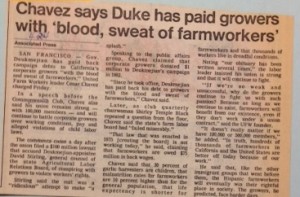Thirty years ago next week, Cesar Chavez delivered one of his most memorable addresses, a speech to the Commonwealth Club of San Francisco.
Ronald Ronald Reagan had just been re-elected president in a landslide. The United Farm Workers union that Chavez had founded two decades earlier had lost most of its contracts and was in retreat from the fields. His speech amounted to a eulogy for his own union. He enumerated the severe problems still facing farmworkers. But then he waved that aside, pointing to a greater truth: Farmworkers had shown that poor people, through collective action, could overcome the most daunting odds – and that lesson would live on in cities across the country. “The message was clear,” he said. “If it could happen in the fields, it could happen anywhere … The coming of our union signaled the start of great changes among Hispanics.”
The speech received extensive coverage, but those weren’t the quotes that made news the next day; the stories focused on Chavez’s attack on Republican Governor George Deukmejian, whose administration was throwing up roadblocks to the UFW’s efforts to organize.
The headlines the next day looked like this:
Here is a link to entire speech: Chavez speech. It’s well worth rereading now from the vantage point of history, for his prescient observations about the future power of Latinos and his own legacy, not in the fields but in the cities of California.

No comments yet.